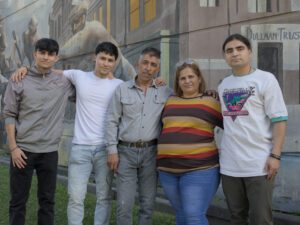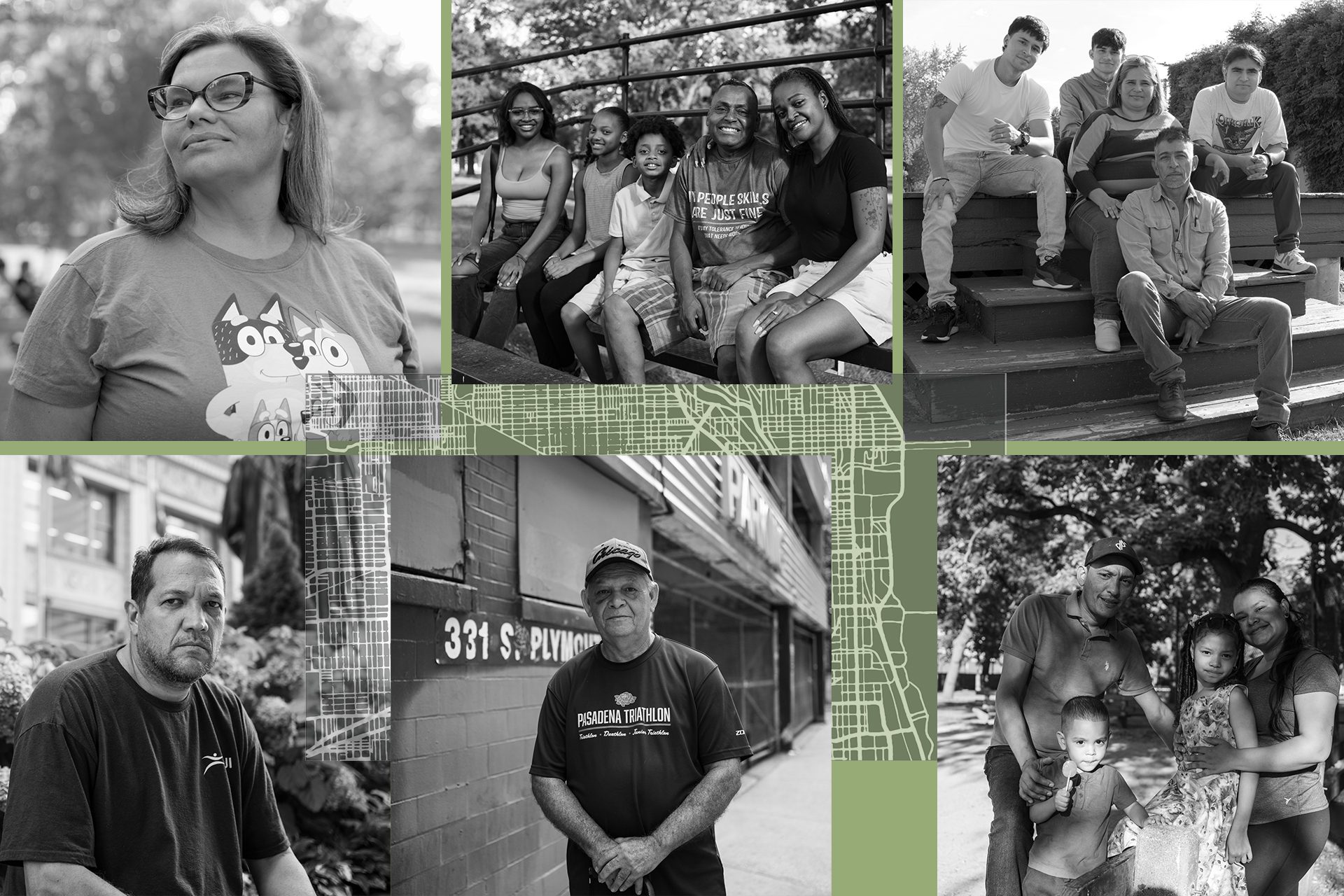 Photo illustration by Max Herman/Borderless Magazine. Photos by Max Herman/Borderless Magazine and Efrain Soriano for Borderless Magazine. Map from Canva.
Photo illustration by Max Herman/Borderless Magazine. Photos by Max Herman/Borderless Magazine and Efrain Soriano for Borderless Magazine. Map from Canva. Six migrant families shared their journey from Central and South America to start a new life in Chicago.
This story was a collaboration between the Investigative Project on Race and Equity and Borderless Magazine.
More than 50,000 migrants have arrived in Chicago on buses and planes over the last two years as part of an effort to pressure Democrats to enact stricter immigration policies.
Most of these migrants have come from Venezuela, fleeing the country’s economic and political crisis, and crossed the United States-Mexico border to seek asylum. More than seven million Venezuelans have left their country since 2014.
News that puts power under the spotlight and communities at the center.
Sign up for our free newsletter and get updates twice a week.
Borderless Magazine and the Investigative Project on Race and Equity spent months speaking to migrants in Chicago as part of our investigation into a company charged with taking care of them in city-funded shelters.
Here are some of their stories.
The Montoya and Merida Family
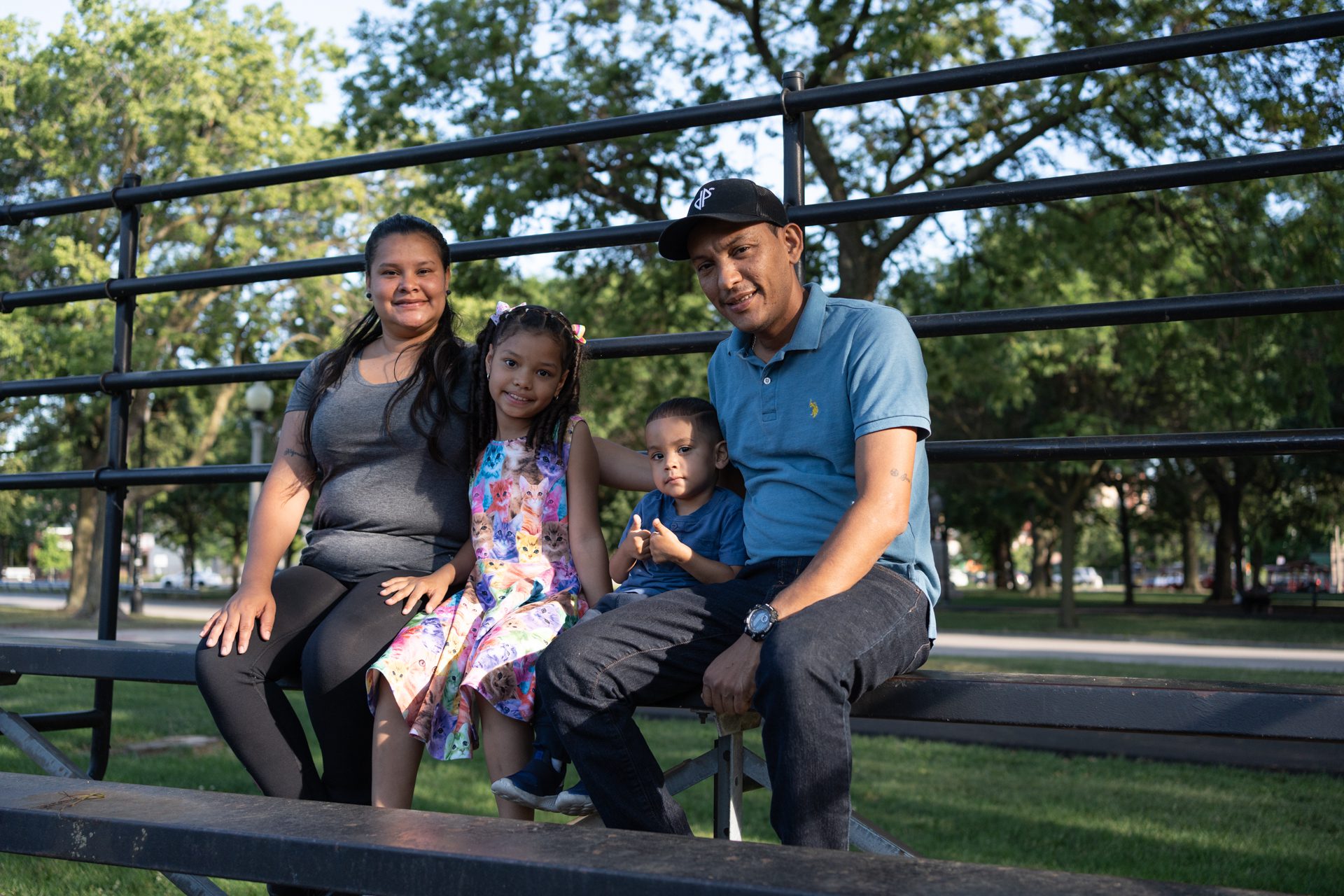
José Montoya and his wife, Gredys Merida, sold everything they had before leaving Colombia with their two children. Montoya worked as an elementary school teacher, and Merida worked for the government. They left hoping to find jobs with a monthly salary that would pay for more than the ones they had, which only covered the cost of one kilo of rice.
Originally from Venezuela, Montoya said the family lived in Colombia for eight years before things worsened. “The only option for us was the United States,” he said.
Montoya carried their 2-year-old son and lugged the family’s belongings while Merida held their 9-year-old daughter’s hand along the journey. They trekked through seven countries to reach the U.S. border.
The family crossed the treacherous jungle that passes through Colombia and Panama. They hired a guide on the Colombian side, but once they crossed into Panama, “God is the only one guiding you,” Montoya said. Previous migrants left a trail of blue and red flags to mark safe and unsafe routes.
The couple recalled days of climbing and hiking. At one point, they crossed a river filled with trash and what they were told were dead bodies. They had no clean water to drink. They feared being attacked by the wild animals that they often heard at night.
Read More of Our Coverage
After surviving the journey, Montoya recalled saying, “Somos fuertes,” or “We are strong.”
“Everyone talks about the jungle, but Mexico was worse,” Merida said. They had to avoid the cartels and the authorities near Mexico City, then hop on trains and cross the desert by foot until Ciudad Juárez, Montoya said.
“Just like there’s bad people,” Merida said, “there’s good people.”
The family has tremendous gratitude for those who helped them along the journey, especially the churches in the U.S. that gave them clothes, jobs and the legal assistance needed to begin their asylum process.
“They extended a hand so we could lift ourselves up,” Merida said. “I didn’t already have someone here, but I will be that person for the people that come in the future.”
The Guerra and Mercado Family
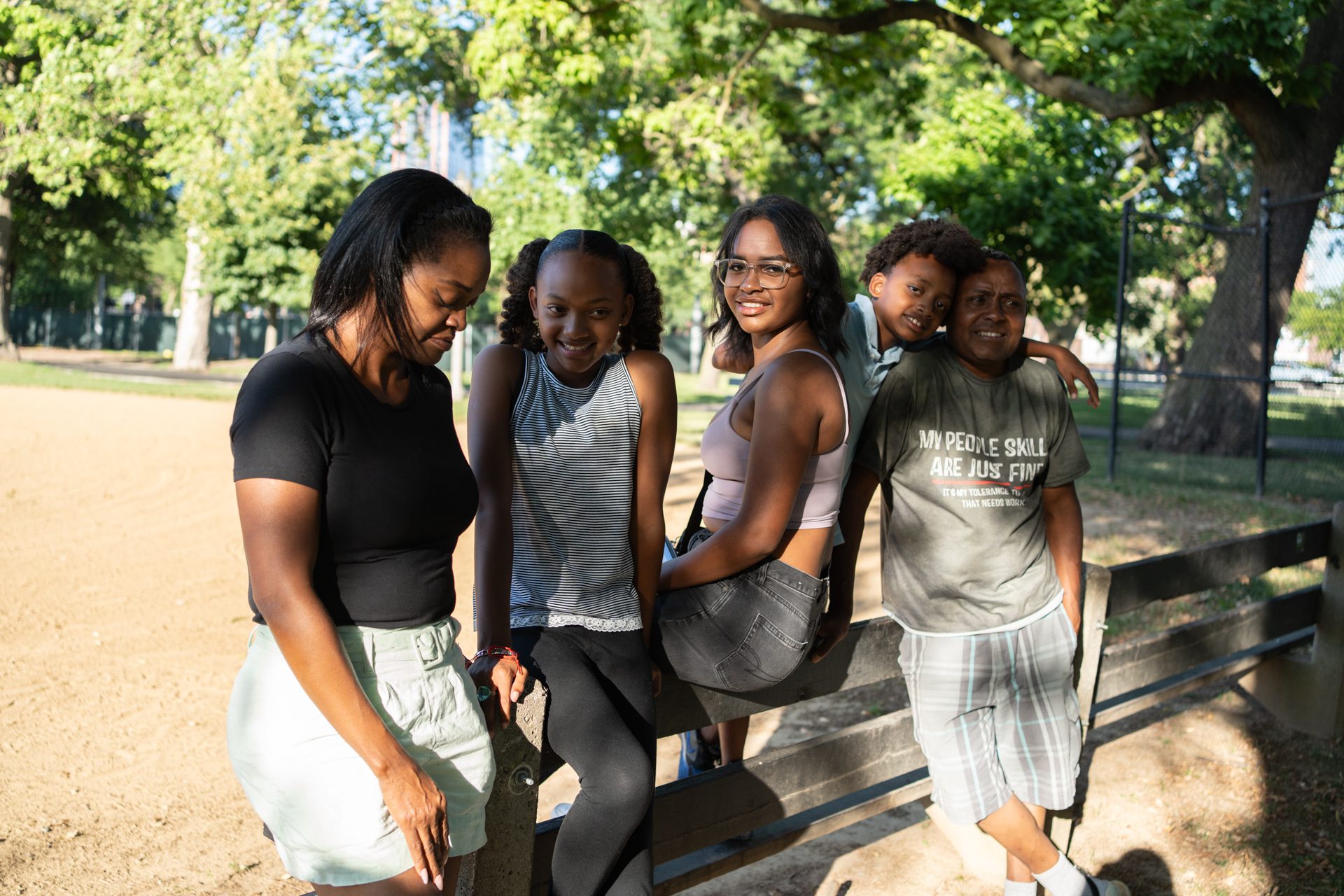
Raúl Mercado worked two human resources jobs while living with his wife, Jasmin Guerra, and four children in Caracas, Venezuela. They couldn’t afford rice, and the cost of living drove them to move to Bogotá, Colombia, in 2018. They began their journey to the U.S. in Nov. 2023.
First, they went to Medellín and crossed the Colombian jungle with relative ease before two sleepless nights on the Panamanian side, where they could hear jaguars and yelps of terror. “I would cry every night because I wanted to return to my house in Colombia,” Mercado and Guerra’s oldest daughter, Adriana, said. The 16-year-old saw her father get robbed at gunpoint.
Guerra said the journey was especially hard for her youngest daughter, Aranza, who suffers from vertigo. Her eldest son, Carlos, carried his sister when she had intense nausea or headaches that prevented her from walking.
“One misstep and you lose your life,” Adriana said.
The family trudged through horrible conditions – trash, makeshift shelters and unsanitary bathrooms – while crossing the rest of Panama. They took a bus across Costa Rica to Nicaragua, Honduras and Guatemala, where they faced cartels and police extortion.
The family spent two weeks looking for a place to stay in Guatemala and finally found shelter on Dec. 24. Along their journey from Nicaragua to Guatemala, the United Nations distributed food and other supplies, such as sunscreen and aid kits.
“In spite of being robbed and scared to death, God has put good people in our path,” Guerra said.
They arrived at Mexico’s southern border the night of Dec. 30. That’s when the eldest son Carlos was separated from the family by the southern Mexican border police and sent to Tuxtla Gutiérrez in the state of Chiapas. The family later reunited and worked on a farm together in Tuxtla. They saved enough money to get to Mexico City, where they continued to work for two months. From there, they traveled north to Ciudad Juárez, evading Mexican migration officers, catching trains and walking through the desert to get there.
They arrived at the Texas border on May 27 and then in Chicago a few days later. They stayed at the Ogden shelter until their three-month period ended in August. The Ogden shelter officially closed in October. The family applied for asylum, but their court date is not until two years from now.
Jorge Ibata

Jorge Ibata, 62, was born in Colombia and raised in Venezuela. He came to the U.S. to build a new life. Ibata owned a muffler shop in the small town of El Vigia. Every Sunday, people would go to the local river, have a beer, fire up the grill and enjoy food, he recalled.
“Life in Venezuela was a paradise,” Ibata said. “It was the only place in the world where gas was completely free. So one had a good life, good food, good cars, good job.”
But in 2007, his life changed forever. A car hit him and for seven years, he lived with screws in his leg. But his leg still gave him trouble and he eventually had to sell his shop and car in order to pay for his operations. Doctors amputated his leg.
Ibata then transported crafts for three hours from Venezuela to Colombia, earning $600 weekly. He left after Hugo Chavez’s rise. His nephew encouraged him to go to the U.S.
At the start of the journey, Ibata stayed behind his family in a Panamanian army base because he could not walk. His prosthetic leg was filled with water, sand and sweat. He developed an ulcer that caused his skin to fall off from rubbing against the plastic of his prosthetic leg.
After recuperating at the army camp, Ibata entered the jungle, navigating cliffs and a river that nearly swept him away. It took him five days to get through. “From miracles, I am alive from miracles,” he said.
Getting through Central America and later Mexico was a different type of danger. Ibata recalls encountering gangs, robbers and police who demanded money. Escaping attempted kidnappings and shakedowns, Ibata gave credit to God for the kind of luck he had.
He felt a sense of relief when he arrived at the U.S. border.
“I was already filled with adrenaline,” Ibata said. “I felt happy in the world.”
U.S. immigration officials sent Ibata to Atlanta, where he spent six months at a detention facility. He was eventually handed a plane ticket to Chicago.
“I like Chicago very much,” he said. “It is beautiful.”
Ibata is taking English classes and wants to find a job. He hopes to save money and move into a home of his own. When he has earned enough money, he wants to return home to Colombia.
Franklin Diaz
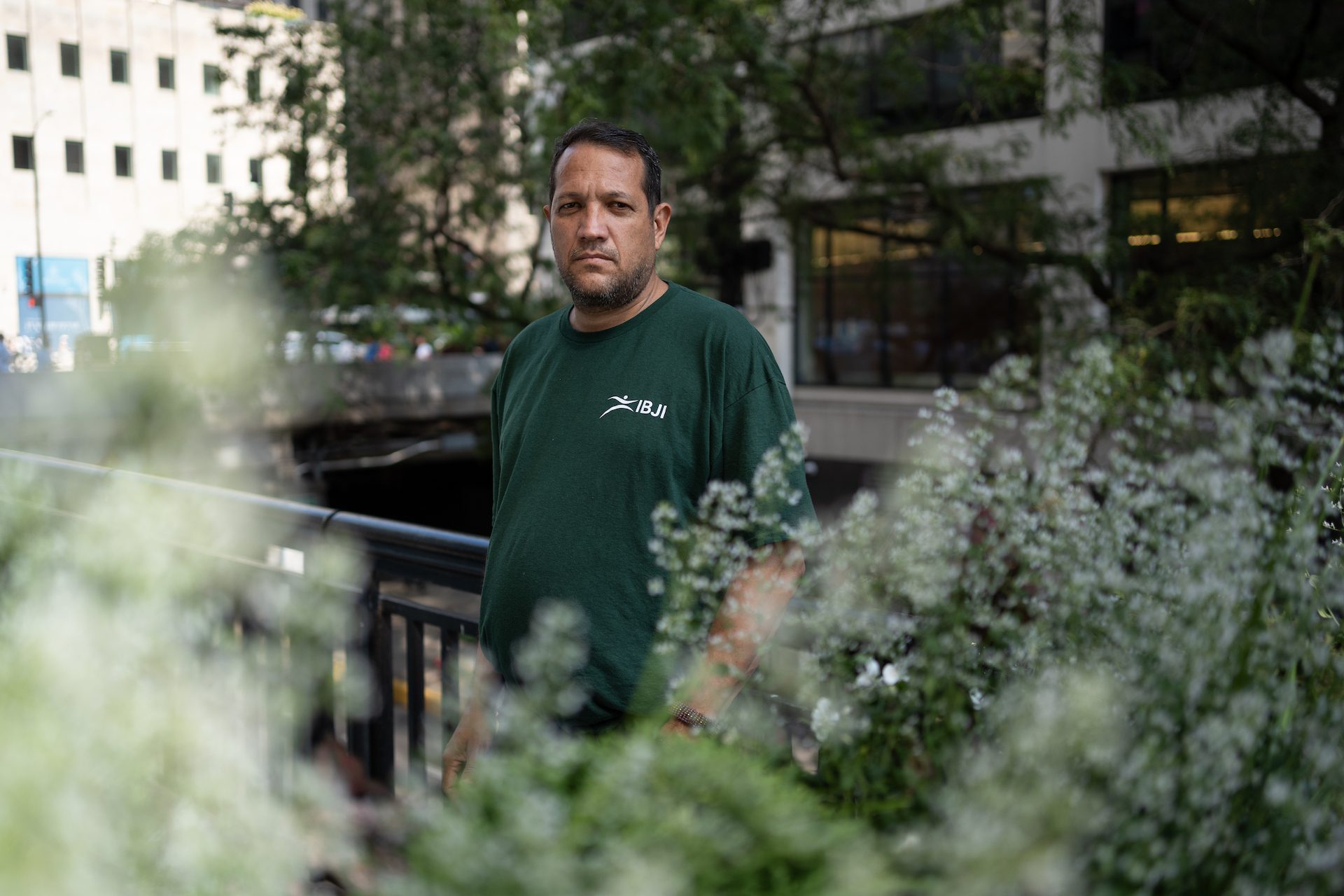
Franklin Jose Delgado Diaz, 50, left Venezuela for a better future for his family. Originally from Maracaibo in the northwest state of Zulia, he worked on a chicken farm. He came to Chicago with his wife, two teenage sons, a 9-year-old daughter, a 5-year-old daughter and a 3-year-old daughter earlier this year.
When Diaz and his family were threatened by a gang at their sons’ baseball academy, he transferred his sons to another academy in the state. After the move, his family set up a grocery shop. He soon received threats from another gang, asking for a $500 fee to continue running the shop.
They sold everything they owned to collect enough money to leave for the U.S.
“It takes psychological preparation, thinking about the family’s future, and starting the journey just by looking at my children,” Diaz said. “And that’s what gave me the strength to keep moving forward.”
They traveled to Colombia, and his wife’s dual citizenship allowed her and their children to travel to Panama. Diaz hiked alone through the Darién Gap for two and a half days.
“There were crocodiles,” Diaz said. “Reptiles, snakes, tigers, many animals in that jungle, and one doesn’t know what’s going to happen.”
Diaz waited for his family in Costa Rica for 25 days. When they got to Guatemala, there was a large police presence. “They extort you if you’re an immigrant,” he said, and you pay up to $20 at each checkpoint to cross. They also faced harassment from cartels.
The family took several buses before crossing to Mexico. After living in Mexico City for four months, they traveled to Tijuana and crossed into San Diego.
“It was a great joy because [the U.S.] treated us so well,” Diaz said. “It was a great emotion [when we arrived] … my sons hugged me and my wife and my sister-in-law and said, ‘We did it, we did it, we did it.’”
The journey is not without scars. Diaz is in therapy now. He and his wife take English classes, while his younger children are enrolled in local schools. His older boys play baseball in Lincoln Park.
“You have to work hard,” Diaz said. “You have to make the land like a farmer and start planting those seeds so that they can be fruit.”
Ana Parra

Ana Parra, 55, came from Venezuela with her pregnant daughter and two granddaughters. They traveled through the Panamanian jungle, hostile locals and corrupt Central American authorities to get here.
Before leaving Venezuela, Parra worked as the director of the child and adolescent protection system and later the women’s institute in the municipality of Camatagua.
Her life back home used to be stable. She had a house, land, cattle and horses. But the family’s world quickly turned upside down.
“My daughter was in the military,” Parra said. “My daughter deserted, due to arbitrary orders from her superiors, and a persecution of the family began.”
Parra said she received an anonymous phone call from someone saying they knew where her child attended kindergarten. Fearing for her family’s safety, they fled to Colombia in 2019.
Her daughter secured a job as a hotel receptionist, while Parra worked as a behavioral therapist and then a chef. But after nine months, guerrillas threatened her daughter and asked her to join their ranks.
The family decided to leave for the U.S. “Imagine what we had to go through,” Parra said. “It hurts because … you leave part of your life.”
In Central America, the family dealt with people who attempted to extort or kidnap migrants. A friend sheltered them in Guatemala. Crossing into Mexico, Parra remembered traveling from town to town, sometimes walking and hitching rides from locals at night. In Mexico, they hopped on trains.
“That was so traumatic for me,” said Parra, who has a bad knee. “You see it in the movies, you could see how the train killed people trying to get on it. I had that horror movie in my mind.”
In Chihuahua, they had to avoid Mexican immigration enforcement. At the border, Parra said her family and hundreds of migrants placed their blankets on a short barbed-wire fence and climbed over. She said that officers soon cornered her and the other migrants. But the crowd was too large for the officers to handle, and they were allowed to move on.
Parra hopes to use her work experience to help people in Chicago. She wants to thank this country for giving her and her family the opportunity to live safely. She hopes to continue her career here and help those in need just as she did back in Venezuela.
Reina Isabel Jerez Garcia
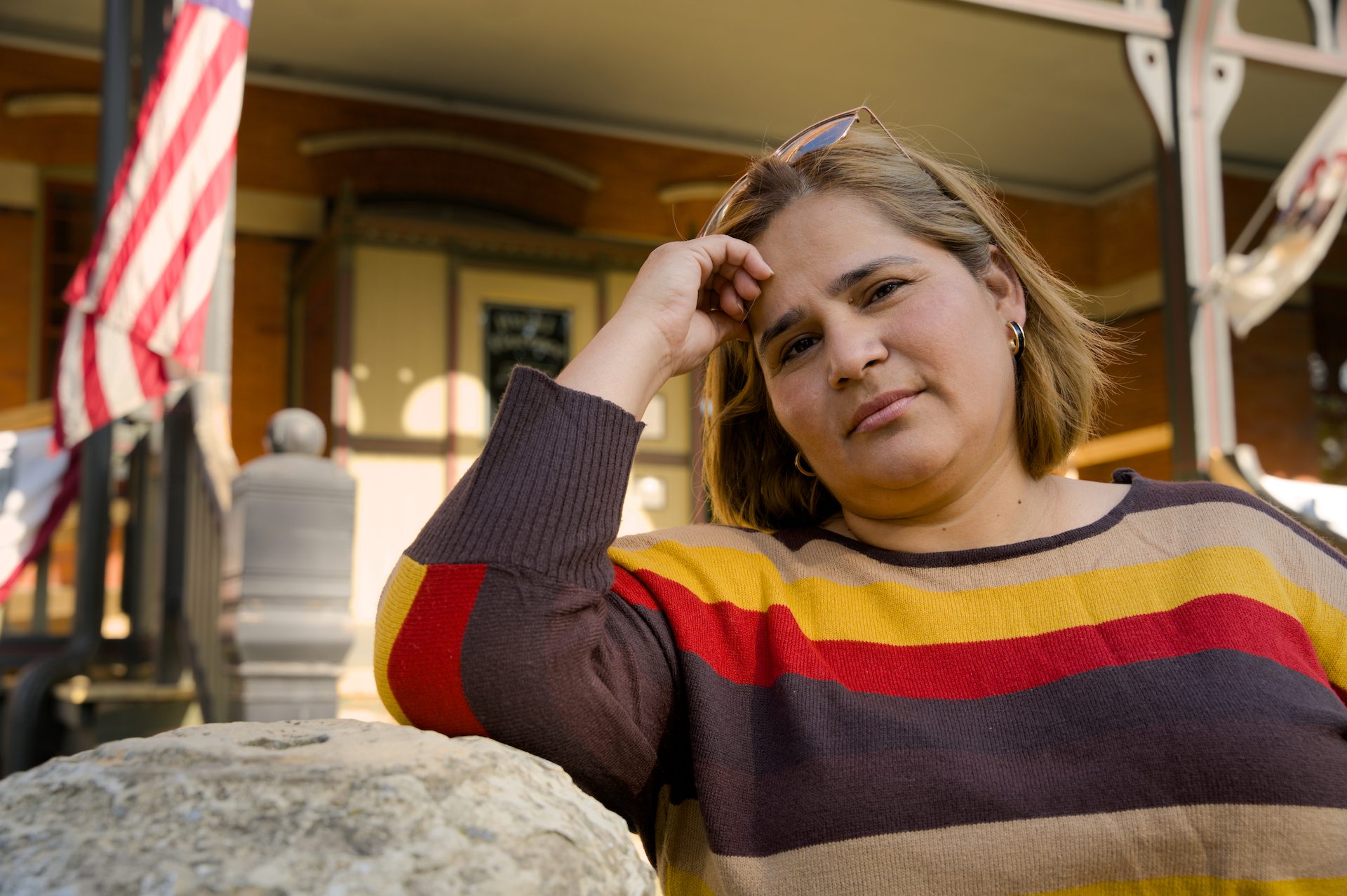
Reina Isabel Jerez Garcia, 38, and her teenage son were the first of their family of five to cross the Mexican border into the U.S. A lifelong organizer for women’s and victims’ rights, Jerez left her native Colombia after guerrilla groups killed her friends and brother and made escalating threats of violence against her.
As they wound their way through shelters and federal immigration facilities in New Mexico and Arizona, Jerez remembered asking a staff person what city was the safest for incoming asylum seekers. The answer she got was Chicago.
She did not know a soul in Chicago when her plane touched down at Midway Airport in August 2023. She recalls waiting on a blanket on the floor in the landing zone at Midway airport, anxious to see how her life in Chicago would unfold. She joked with contractors about the quality of the food being distributed to the arriving families — “food for dogs,” she called it. They laughed at her jokes. “I always tell it like it is,” she said.
